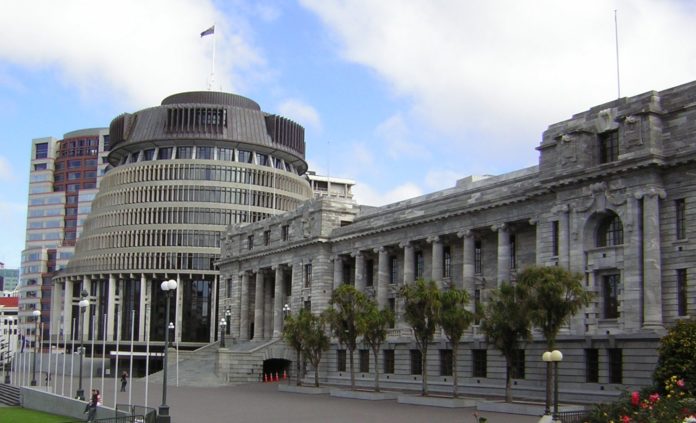Political Roundup: If the NZ First Foundation accused are not guilty, then who is?
It’s shocking that the accused in the NZ First Foundation trial were declared “not guilty” in the High Court today. But it’s not actually surprising.

There was always a strong chance that the Serious Fraud Office (SFO) was not going to get a conviction over the machinations used to keep large donations to the New Zealand First party secret. The revelation of this scandal in 2020, and the trial over the last month, may well have proven that the Electoral Act was breached, but it was far from certain that the accused were guilty of what the authorities were charging them with.
This is because the SFO chose not to lay charges against the defendants, or other party officials and politicians, under the Electoral Act, but under the Crimes Act instead. Rather than arguing that the Electoral Act’s requirements that larger donations be declared to the Electoral Commission (and therefore made public), the SFO essentially argued in court that the accused, who were running the NZ First Foundation, had stolen the money and were guilty of theft.
As the accused were able to argue in their defence, there was no one complaining of theft – certainly not the New Zealand First party, nor the donors. The money had been given to help the party in their electioneering, and that’s how the money genuinely appeared to be spent.
The Serious Fraud Office has some explaining to do
The SFO now need to front up and be accountable for failing to get a conviction for what appears to be a very clear breach of the Electoral Act.
As I noted in an earlier column that questioned the SFO’s strategy, there appeared to be two reasons why charges were laid under the Crimes Act: “It seems likely that the maximum penalties that can be imposed under this act are deemed too low, and so the SFO have used the Crimes Act instead. This raises the question of why the maximum penalties under the Electoral Act are so low. Alternatively, the SFO’s decision to use the Crimes Act might have been because it was too difficult to prove that the Electoral Act has been breached.”
The latter now looks to be the most likely explanation. The SFO may have had trouble using the Electoral Act due to its severe limitations, especially because the accused were not party officials. The Act places responsibility for party donations with the Party Secretary, who was apparently unaware of the donations arrangement. The Foundation had been set up, after all, to keep the donations away from the formal organisation.
In fact, it was the Party President in 2020, Lester Gray, who seems to have been the whistleblower, resigning from the party over the donations arrangements and bringing them to the attention of the media. The SFO likely was hesitant to prosecute them or other officials who had little knowledge of the behaviour at the time it was happening.
The SFO could have gone after other politicians in the New Zealand First party, including leader Winston Peters, who had played a role in fundraising. However, there appeared to be no evidence that he had authorised the way the Electoral Act had been circumvented. The defence made much of the SFO’s failure to call Peters as a witness and “victim” of the alleged crime. The judgement makes it clear that very large donations ended up being used for the purposes both the donors and the party intended. That meant the accused walked free, but it is a damning indictment on our politics.
The Electoral Act needs a significant overhaul
The trial outcome demonstrates that the Electoral Act is full of holes, and that the public cannot have confidence that some large donations to politicians are ever declared. Essentially this is a case study in how you can drive a bus through the Electoral Act.
There needs to be a proper overhaul of electoral laws. Unfortunately, the minor reforms that the Government are proposing won’t address any of this. Even the Independent Panel that was recently set up to look into electoral matters have been pointed to look in a different direction. The Government needs to change the remit of that panel, or else establish something more rigorous like a Royal Commission.
The current Electoral Act appears to operate on a “high trust model”, akin to the Wage Subsidy Scheme under Covid, in which business was trusted to be honest with the $20bn of handouts. Similarly, politicians and their parties are expected to follow the rules, despite knowing there is really no substantial monitoring and enforcement of those rules.
And in fact, revelations of the large donations and the violation of the disclosure requirements only really come about when whistleblowers and the media do some digging. There has to be a better way.
At the moment the Electoral Commission is toothless in this regard. But even when the high-powered SFO spent years on this case it could not get a conviction – despite there being open admissions that the very basic purpose of the Electoral Act’s donation disclosure regime had been seriously violated.
Max Rashbrooke, who is researching the role of money in politics at Victoria University of Wellington, tweeted the following in response to the “not guilty” verdict: “So, in New Zealand now, you can take $750,000 in donations intended for a political party, declare none of it, and get off. Donors can split donations to hide them, and get off. Urgent reform needed. I’ll be writing to the Minister of Justice accordingly.”
The failure to hold politicians, party officials, party fundraisers and donors to account really does bring the whole system of money and politics into disrepute in New Zealand.
If now isn’t the time to demand a proper clean-up of the rules, institutions, and behaviour of politicians and their wealthy backers, then when will be?
Further reading on NZ First Foundation trial
Matthew Scott (Newsroom): Defendants found not guilty in New Zealand First donations trial
Sam Hurley (Herald): NZ First Foundation acquittals: Winston Peters lashes out at ‘spurious allegations’, SFO and media
Sam Hurley (Herald): NZ First Foundation case: Accused pair not guilty of donations fraud after court grants permanent suppression
RNZ: NZ First Foundation case: Men charged over handling of donations found not guilty
Catrin Owen (Stuff): Duo found not guilty in New Zealand First Foundation political donations case
No Right Turn: So its worse then
Other items of interest and importance today
COST OF LIVING AND INFLATION
Josie Pagani (Stuff): We’re being pickpocketed by arrogant corporates
Chris Trotter (Daily Blog): Fighting inflation – what would a democratic-socialist government do?
Shane Jones (Herald): Inflation runs amok while MPs chase their tails (paywalled)
Herald: Editorial: Greedflation and price-gouging – why we need to share the inflation pain (paywalled)
Tim Hunter (NBR): How banks fuel house price inflation (paywalled)
PARLIAMENT AND GOVERNMENT
Peter Dunne (Newsroom): It’s looking as if neither Labour nor National wants to win in 2023
John MacDonald (Herald): Don’t blame the Government for advertising spend-up
Graham Adams (The Platform): Ardern dodges questions on Mahuta’s conflicts in Three Waters
Talia Parker (Herald): Why Waiariki MP Rawiri Waititi wants ‘discriminatory’ electoral law changed (paywalled)
Martyn Bradbury (Daily Blog): Politically triggering: Cancelling Guy Williams, youth Parliament walk out & banning Taxpayers Union
Sharon Brettkelly (RNZ): Drama behind the scenes at the Film Commission
Phil Pennington (RNZ): Statistics experts fear law change may lead to unregulated data sharing
Rachel Maher (Herald): Taxpayers fund Dr Siouxsie Wiles documentary
ODT: Editorial – Labour’s polytechnic shambles
IMMIGRATION CHANGES
Matthew Hooton (Herald): The method in Labour’s migration makeover (paywalled)
Rachel Smalley (Today FM): Labour has once again gone down the ideology route
Rachel Smalley (NBR): Labour goes after the millionaires (paywalled)
Oscar Jackson (Today FM): Stuart Nash defends new investor visa program, calls National’s ‘broke’
LOCAL GOVERNMENT AND ELECTIONS
Stephen Forbes (Local Democracy Reporting): Do ‘stars’ make good politicians? Ex-All Black Keven Mealamu and the council elections
Moana Ellis (Stuff): Local government conference: ‘We’re ready for change’
The Platform: LGNZ’s Inclusive Campaigning Guidelines
Ben Goodale (Herald): Auckland mayoralty: Leo Molloy’s antics a lesson in why you should be careful what you don’t vote for (paywalled)
COVID
Jo Moir (Newsroom): Lack of Covid rules dividing team of five million
Katy Cox (RNZ): Covid-19 cases at border skyrocket after pre-departure testing scrapped
Dubby Henry (Herald): Ministry of Education recommends schools enforce masks in Term 3
INTERNATIONAL RELATIONS
Stefan Dimitrof (Māori TV): New Zealand not a ‘condescending coloniser’ – Jacinda Ardern
Biman Chand Prasad (Dev Policy Blog): Australia and New Zealand’s silence on democracy and human rights in the Pacific
Joanne Wallis, Anna Powles, and Solstice Middleby (The Conversation): Australia and New Zealand have a golden opportunity to build stronger ties in the Pacific – but will they take it?
ECONOMY AND EMPLOYMENT
Liz McDonald (Stuff): Survey shows businesses worry about economy, staff shortages
Guy Te Kiniwe Royal (NBR): Once were artists (paywalled)
Matteo Zhang and Louis Collins (RNZ): Youth MPs to focus on glaring wage gap
CLIMATE AND ENVIRONMENT
Marc Daalder (Newsroom): Does Labour have the guts to act on climate?
Richard Harman: Paying the price to curb climate change (paywalled)
Herald: Editorial: Climate change outlook – extreme heat with a chance of burning (paywalled)
Simon Bridges (NBR): As economic times change, watch the retreat of ESG (paywalled)






